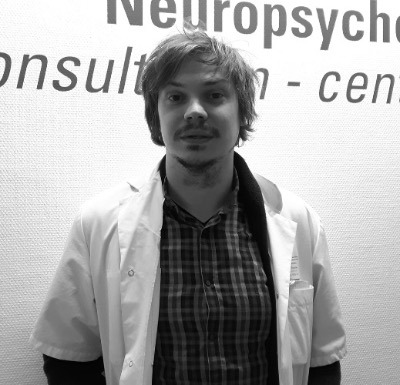Expert Interview: Understanding neuropsychology (3/3)
Published Jul 3, 2020 • By Andrea Barcia
Timothée Albasser is a neuropsychologist at the Hautepierre Hospital in Strasbourg, France. He answers all our questions about clinical research, including the difficulties, real advances and hopes for new therapies for Alzheimer's disease.

Hello Timothée, thank you for agreeing to answer our questions. What does research in neuropsychology involve?
Research in neuropsychology involves the development of tests or techniques for the assessment of cognitive, affective and behavioral disorders. It frequently draws on neuroscience and cognitive psychology. Research takes place in structures that depend on the main public research organizations (university hospital centers, national scientific and medical research institutes, etc.). In the private sector, pharmaceutical laboratories may call on neuropsychologists to develop clinical research protocols and evaluate the effects of new treatments.
Indeed, for the past twenty years, positions for psychologists have been created in the institutional framework, especially for Alzheimer's patients. There is a high prevalence of the major neurological disorders. In 2001, the population of the European Union was estimated at 380 million inhabitants, 16.5% of whom were over 65 years of age. Alzheimer's disease accounted for 2.5 million people, traumatic brain and spinal cord injuries due to traffic accidents for 1.5 million, strokes for 2 million, epilepsy for 2.3 million, Parkinson's disease for 600,000 and multiple sclerosis for 230,000 (ADREC - Association for the Development of Brain and Spinal Cord Research) (Montreuil, 2005).
What are the current Alzheimer research topics? And, what avenues are being explored?
Currently, many therapeutic studies are underway involving patients with mild to mid-stage Alzheimer's disease. These studies are funded by major pharmaceutical companies (ex: Roche, Eisai, Biogen). They aim to test new molecules, which would act on the brain lesions present in Alzheimer's disease: amyloid plaques (deposits of the beta-amyloid protein) and neurofibrillary degeneration (disaggregation of the tau protein into filaments that form tangles; an indicator of neuronal death).
There are two major groups of study:
- "Anti-beta-amyloid" studies: addressing the amyloid hypothesis and focusing on the elimination of amyloid plaques
- "Tau" studies: focusing on the tau protein, using neuromolecular mechanisms to prevent neurofibrillary degeneration (neuronal death)
In short, there are two main mechanisms: drugs that act on beta-amyloid plaques (showing few results, studies have stopped) and ongoing studies investigating the anti-tau hypothesis (passive immunotherapy) and acting on neurofibrillary degeneration (results are still pending).
What innovations or results can we expect to see one day?
- In the short term: to better understand the disease and especially the mechanisms involved in degeneration.
- In the long term: a cure for the disease. Researchers are working on it and thousands of people are involved: doctors, pharmaceutical companies, neuropsychologists, nurses, pharmacists, etc.
Alzheimer's patients play a key role in all of this: they are actors in both their own health and in advancing research. Everyone involved really wants to find a treatment that will cure the disease. Through hard work and effort, my personal goal is to understand and find an effective treatment for a disease we struggle with every day.
You can read the first and second parts of the interview with Timothée Albasser in the Health Magazine here:
Expert Interview: Discovering Neuropsychology (1/3)
Expert Interview: Understanding Neuropsychology (2/3)
Was this article helpful to you? Feel free to share your thoughts with the community!
Take care!
--
Meet Timothée Albasser

Timothée Albasser is a neuropsychologist at the CMRR (Centre Mémoire de Ressources et de Recherche) of the Hautepierre Hospital in Strasbourg since April 2014. Holder of a Master II in clinical and cognitive neuropsychology obtained at the University of Strasbourg, he also holds an inter-university diploma in Normal Memory and Memory Pathologies obtained at the University of Medicine of Strasbourg.
He is active in clinical neuropsychology, in the context of memory consultation and research neuropsychology (Hospital Clinical Research Program and therapeutic trials), as well as at the Saint-François Geriatric Day Hospital. At the same time, he also works as a clinical studies technician, mainly for cohort studies. He is part of the team at the CMRR in Strasbourg composed of Professor Blanc, Dr. Cretin, Dr. Martin-Hunyadi and Dr. Philippi. The CMRR team is active in research and in the publication of scientific articles, particularly in the field of Alzheimer's disease and Dementia with Lewy bodies.
Sources :
https://www.mayoclinic.org/es-es/diseases-conditions/alzheimers-disease/diagnosis-treatment/drc-20350453
https://www.brightfocus.org/espanol/la-enfermedad-de-alzheimer-y-la-demencia/factores-de-riesgo-de-la-enfermedad-de-alzheimer
https://www.dementiacarecentral.com/caregiverinfo/causas-y-factores-de-riesgo-de-la-enfermedad-de-alzheimer/
https://blog.fpmaragall.org/existe-tratamiento-para-la-enfermedad-de-alzheimer

 Facebook
Facebook Twitter
Twitter


